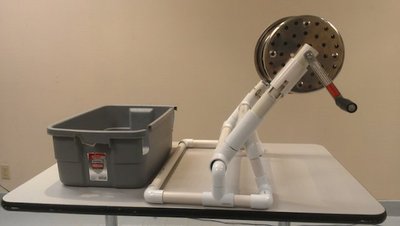Build-your-own device to help farmers fight foodborne illness outbreaks in US
Leafy greens have the highest incidence of foodborne illness outbreaks in America, and some small-scale farmers don’t have the facilities to wash their produce before market. But a simple and inexpensive device designed by University of Houston students could help small farmers clean their leafy green produce before market to reduce bacteria levels.
Professor Jay Neal and his student Cecilia Zerio Egli, of the Conrad N Hilton College of Hotel and Restaurant Management (HRM), developed a device made from PVC pipe, a stainless steel strainer and a five-gallon drum.

Leafy vegetables are spun inside the stainless steel container while being showered with water to remove dirt. The container then lowers into a plastic drum filled with a vinegar and water solution that kills harmful bacteria. It is then lifted back up to its original position, rinsed with clean water and spun again.
In a commercial farm operation, produce would be washed with a chlorinated treatment from a water-wash system. “When you buy packaged lettuce that says ‘washed three times’ that’s how it was done,” said Neal. “Small farmers don’t have that.”
Neal and Zerio Egli intend to make plans for the device available to farmers so they can build it themselves, hoping to reduce the incidence of foodborne illness from produce sold at farmers markets.
“I’ll be making an information sheet which will have the plans for how small farmers can easily build the device themselves and where they can purchase the inexpensive materials,” said Zerio Egli. “And farmers can manipulate the size to fit their individual needs.”
The sheet will also include information for farmers about best practices when growing, harvesting and washing produce. Zerio Egli and Neal hope to make the plans available in the US autumn to farmers and farmers markets.
AFGC reviews progress on food and grocery manufacturing targets
In its latest food and grocery manufacturing sector report, AFGC reflects on the...
$15m AI space project to help boost Australian agriculture
The Australasian Space Innovation Institute is developing an AI-enabled geospatial national...
Barry Callebaut opens chocolate innovation centre in Singapore
The Callebaut Global Innovation Center is helping to advance the future of chocolate and cocoa...












